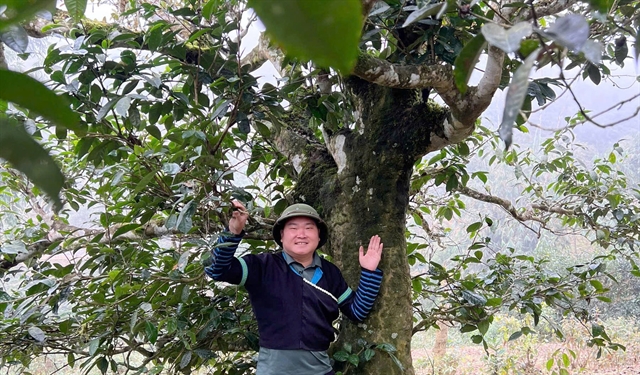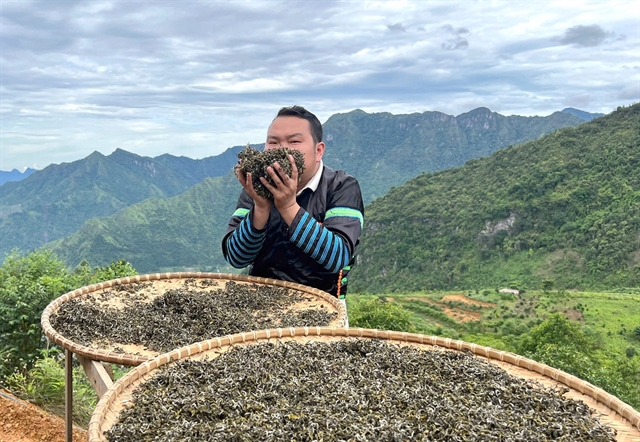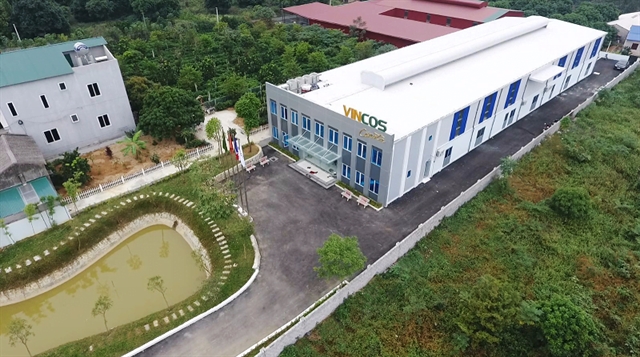 Society
Society

 |
| Sùng A Tủa returns home in Phình Hồ Commune where there are hills of the ancient Shan Tuyết tea trees. Photo tienphong.vn |
LÀO CAI – A Mông ethnic law graduate has turned his people’s ancient heritage into a source of pride and prosperity, using the story of Shan Tuyết tea to help his community escape poverty and build a better life.
At 34, A Tủa returned to his mountainous homeland in the northern province of Lào Cai after completing his law degree, determined to make a difference. Instead of pursuing a conventional legal career, he chose to revive the centuries-old Shan Tuyết tea tradition, known for its unique flavour and cultural significance.
Exploring the homeland treasure
Born and raised in Phình Hồ Commune in the northern mountainous province of Lào Cai, home to hundreds of ancient Shan Tuyết tea hills, A Tủa deeply understood the hardships faced by his family and fellow villagers.
After graduating from the University of Law in Hà Nội, A Tủa decided to return home.
To the young man, Phình Hồ was not only a place of hardship but also one of majestic beauty, an undiscovered 'treasure.'
“That treasure is not far away but in the houses, the brocade costumes, the soulful sound of the flute and the tea buds covered with morning dew,” the ethnic man told tienphong.vn.
“I see my homeland village as so beautiful and full of potential that it can help develop tourism like other places in the country.”
He began his journey with the simplest of actions — keeping the village clean and green.
He persistently visited each household, urging villagers to change their old cattle-grazing habits, build solid barns and move their livestock away from their homes.
"At first, it was very difficult. People did not understand the long-term benefits or what community tourism was, so they were hesitant and did not dare to try," A Tủa added.
The rejections and timid looks did not discourage him. Instead, they strengthened his resolve as he continued campaigning, setting examples through his own success so that people would trust and follow.
Bringing ancient tea to a digital platform
 |
| Sùng A Tủa is determined to make Shan Tuyết tea more popular. Photo tienphong.vn |
The heart and soul of Phình Hồ is the ancient Shan Tuyết tea hills, which are surrounded by clouds all year round.
The tea buds are precious gifts of nature. However, for many years the 'treasure' had not become well known and output remained unstable.
A Tủa saw this as a golden opportunity.
He established a co-operative named Hồ Shan Trà, or Hồ Shan Tea.
The co-operative is not only a place where villagers produce Shan Tuyết tea together but also a springboard for building a brand for Phình Hồ Shan Tuyết Tea.
He personally visits each household to guide them through standard harvesting and roasting processes to ensure quality, so that each product becomes a source of pride.
He has also boldly embraced technology to bring Shan Tuyết tea to a wider audience.
A Tủa set up a TikTok account named 'A Tủa Phình Hồ' to upload rustic videos he makes himself about the lives of Mông people, the scenery of 'Phình Hồ – village in the clouds,' and especially the story of Shan Tuyết tea trees.
On the 'A Tủa Phình Hồ' TikTok channel, simple video clips show the daily life of Mông people — scenes of villagers picking tea in the fields, ethnic children in colourful dresses playing, or the sea of clouds rolling in every morning over the mountains.
These genuine films have touched the hearts of hundreds of thousands of people. Many clips have reached millions of views, turning Phình Hồ from an unfamiliar name into a 'cloud-hunting' destination young people long to visit.
His livestream sales sessions are not just a place for transactions but also where he tells stories of the Northwest mountains and forests and shows the stages of the manual tea-drying process by the firewood stoves of elderly artisans. As a result, Phình Hồ Shan Tuyết tea has become famous across the country, bringing stable sales and high economic value to local people.
Sustainable livelihood
A Tủa’s success has become an inspiring story for his community. From being hesitant, many households now confidently open homestays, welcoming guests with their own warmth and sincerity.
A Tủa and other villagers have introduced unique experiential tourism products, allowing visitors to take on the role of Mông villagers — hand-picking tea leaves, roasting tea over a wood fire, trekking to conquer Háng Tề Chơ Waterfall, and immersing themselves in re-enacted festivals featuring ethnic dances and courting songs.
He also established a group of 30 young Mông villagers providing taxi motorbike services for visitors.
At present, nearly 400 households in Phình Hồ Commune are connected to the service supply chain, from selling bundles of organic vegetables and local chickens to providing accommodation and tour packages.
Sustainable livelihoods have been formed from the homeland itself.
A Tủa has received numerous certificates of merit and commendations from the communal to central level for his successful start-up model, which has made a significant contribution to local economic development.
Yet perhaps the greatest reward for him is seeing the bright smiles of local people, witnessing the village’s daily transformation and knowing that Mông cultural identity is not fading but shining — becoming a source of pride and a means of livelihood for the entire community.
A Tủa’s journey proves that with deep love for one’s homeland and an innovative, creative mindset, young people can indeed create extraordinary stories — turning seemingly quiet cultural heritages into powerful resources for economic development and poverty reduction. VNS




